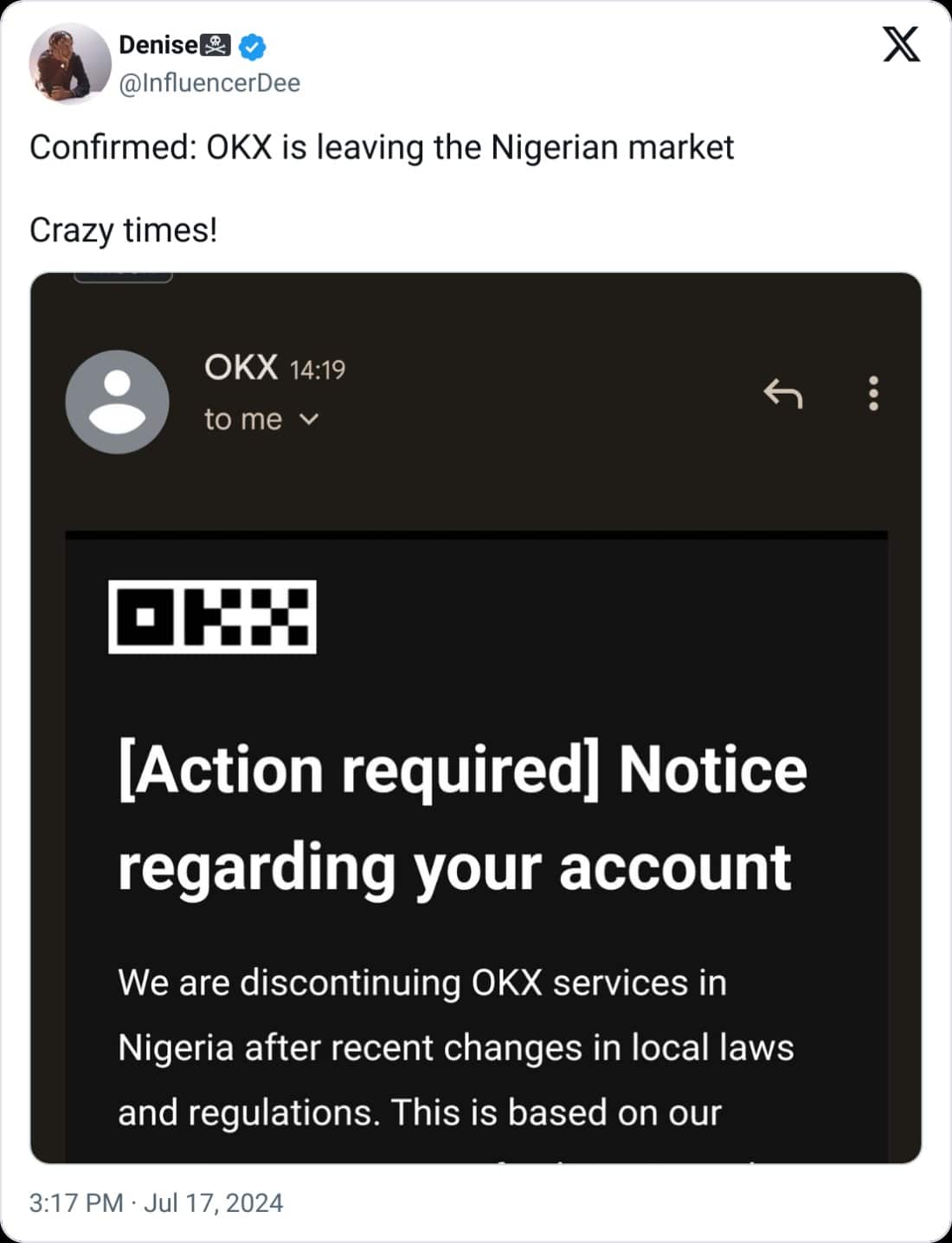Nigerian cryptocurrency analysts have expressed strong criticisms following the exit of the crypto exchange OKX from Nigeria. This departure has sparked significant concerns about the country’s regulatory landscape and its impact on the rapidly growing blockchain and cryptocurrency sector.
Speaking with a crypto news platform, Rume Ophi, a local crypto stakeholder, voiced his frustration over the sudden exits of several crypto exchanges from Nigeria. He questioned how these exchanges entered the country and are now swiftly leaving.
“It is shocking to know that we, as industry leaders, are trying to engage the government on the way forward to good regulation, and exchanges are already leaving because of regulations that we don’t even know about,” he stated.
Slow Regulatory Progress
This slow regulatory progress is seen as a significant setback for Nigeria, especially compared to countries like South Africa, which is emerging as a leader in the continent’s cryptocurrency market. The OKX Nigeria exit has highlighted these regulatory challenges.
Ophi noted the stark contrast between the prominence of Bitcoin and cryptocurrency in the forthcoming US elections and the regulatory confusion in Nigeria, calling the situation “embarrassing, to say the least.” Drawing comparisons to the European Union’s approach, Ophi pointed out that the European Union’s (EU) Markets in Crypto-Assets (MiCA) law continues to undergo amendments and refinements through collaborative efforts.
He urged the Nigerian National Assembly to engage in meaningful discussions to establish effective regulations. “Regulations are an overtime thing; gradually, we get better,” Ophi noted, emphasizing that regulators should focus on regulating rather than making laws.
Call for Quicker, Transparent Regulations
Obinna Uzoije, a data and policy expert with Africa Policy Conversations, emphasized the need for a quicker, transparent, and more welcoming regulatory framework, highlighting the industry’s potential to create numerous employment opportunities for Nigerian youths.
“This is not just about cryptocurrency; it has been labelled a crime in Nigeria to deal with digital assets. This is an entire industry of marketers, community managers, developers, traders, and so much more,” he explained.
The OKX Nigeria exit and other exchanges’ departures are seen as missed opportunities for Nigeria, reminiscent of the lost potential during the 2021 bull market. Uzoije argued that Nigeria needs to demonstrate leadership in the blockchain and cryptocurrency sector, not just in words but in action.
OKX exchange, however, announced on July 18 that Malta will serve as its MiCA hub to ensure compliance with regulatory requirements in the European Union. This contrasts its decision to cease services in Nigeria due to “recent changes in local laws and regulations.” The OKX Nigeria exit is part of a broader trend where exchanges are moving to more crypto-friendly jurisdictions to continue their operations.

Regulatory Issues and Market Reactions
OKX stopped Naira withdrawals in May 2024 due to regulatory issues after Binance was accused of manipulating Nigeria’s currency and laundering money. This incident has fueled further debate among analysts and stakeholders regarding the regulatory environment in Nigeria. The OKX Nigeria exit has intensified discussions about the need for clear and supportive regulations to foster the growth of the country’s cryptocurrency market.
According to reports, the regulatory issues faced by exchanges like OKX and Binance are not isolated incidents but part of a broader pattern of regulatory challenges in Nigeria. These challenges have prompted exchanges to reconsider their presence in the Nigerian market, leading to the OKX Nigeria exit and similar moves by other crypto platforms.
Industry Implications
The OKX Nigeria exit has significant implications for the local cryptocurrency industry. It raises questions about the future of crypto exchanges in Nigeria and the country’s ability to retain and attract blockchain and crypto-related businesses. Analysts believe that without swift and transparent regulatory reforms, Nigeria risks falling behind other countries in the region that are making strides in embracing cryptocurrency and blockchain technology.
As the OKX Nigeria exit continues to spark criticism and debate, it remains to be seen how Nigerian regulators will respond. Industry stakeholders are calling for a collaborative approach to develop regulations that balance the need for oversight with the potential for innovation and growth in the cryptocurrency sector.
Conclusion
The OKX Nigeria exit serves as a wake-up call for regulators and stakeholders, highlighting the need for a coherent regulatory framework to maximize the potential of the cryptocurrency industry in Nigeria. This situation emphasizes the critical intersection of regulation and innovation, with Nigerian regulators’ response shaping the future of the local crypto market and its global standing. The BIT Journal provides in-depth coverage and expert analysis of these developments and their broader implications.




























